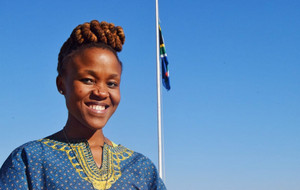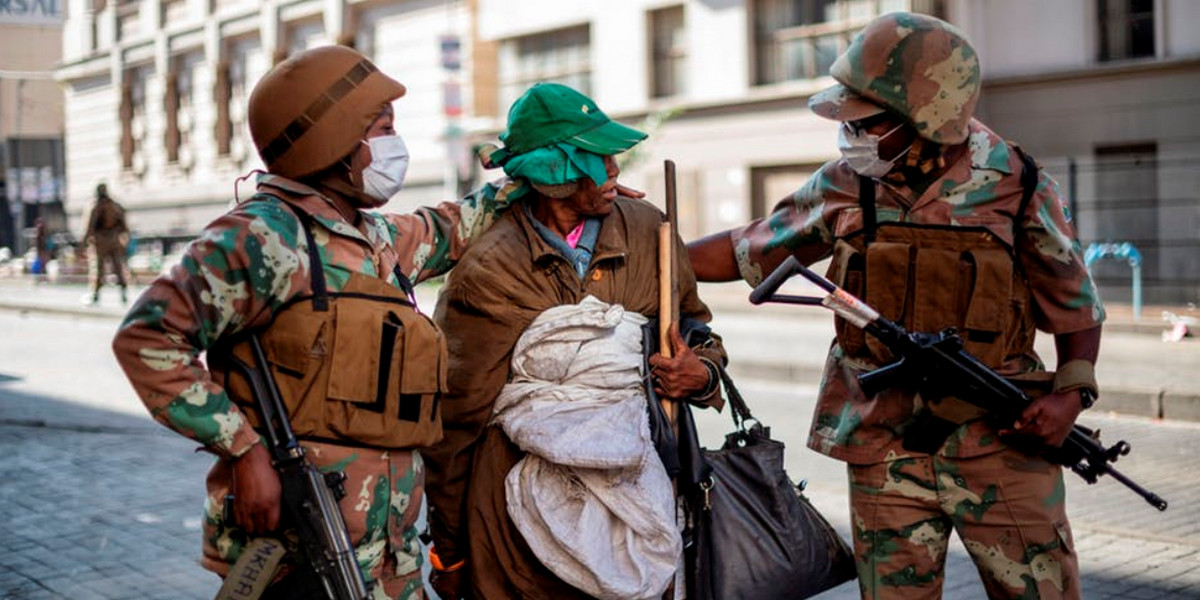Telling my story from South Africa, by Lydia Lehlogonolo Machaka
The consequences of racism and climate change are interlinked. All increase exposure, vulnerability, and drive many communities further into deep poverty and inequality. The 2020 lockdown period that is brought by the COVID-19 pandemic has resurfaced the increasing abuse of power, suffering, inequality, and social injustice in many countries around the world including South Africa (RSA) and these problems may persist unless the global economic and political system transforms – popularly known as systemic change. I will share a bit about my experiences and how such systemic problems might be exacerbated by climate change in South Africa.
South Africa is among the world’s most unequal societies. However, there is a long history of segregation and discrimination that was institutionalized by the flawed apartheid system[1] from the onset and many still bear the consequences. For example, historically, urban areas (predominantly whites residences) were spatially distanced from the non-whites, particularly, the African poor who were forcefully moved and relocated to generally infertile lands and undignified living conditions in densely populated townships, informal settlements, and rural areas. I grew up in a rural village from one of the poorest regions of RSA in the Limpopo Province. We used to walk and sometimes commute by public transport for about 14 kilometers to-and-from school in the nearby township every school day for better education. Before we lived in the villages, my family and hundreds more were forcefully removed from a community area (previously called New Look) near Polokwane (the then Pietersburg city), under the previous government, to create a new industrial zone. The land restitution which began in 1996/7 and then suspended in 1998 remains a mysterious systemic conundrum. Like many disadvantaged families, the New Look residents are still fighting a never-ending battle since 2001. Therefore, it becomes impossible for any parent to pass down a lasting inheritance for their children and grandchildren from a place of dispossession. Although the landscape is gradually changing, the architectural and spatial plan of RSA’s human settlement and housing shows a clear message of disenfranchisement and perpetuated poverty and inequality.
The apartheid system is exemplary to the nature and impacts of the global capitalist system and imperialism brought by an unfair share of wealth, resources, exploitation, and indecent work. Such systems are characterized by their unsustainable limits to growth, consumerist values and divorce from planetary boundaries. Although much has been achieved in 26 years of RSA’s democracy, the outcomes of addressing the rising poverty and inequality remain short-lived. RSA’s developmental problems are further compounded by the challenges of coping with climate change impacts. Climate change has undue negative effects on the environment and social factors relating to health and wellbeing such as clean air, healthy drinking water, adequate food, and nutrition as well as safe shelter and energy security, which is a violation of basic human rights. Unfortunately, living in an already water-stressed and coal-intensive country, many communities – particularly those living in the periphery – are perpetually struggling to enjoy such benefits.
There is overwhelming scientific evidence that there is clear human influence on the climate system, and recent anthropogenic emissions of greenhouse gases (GHG) are the highest in history. A study has also shown that the alteration of natural ecosystems through rapid biodiversity, habitat loss, and the modification of natural environments can aid the development and spread of emerging infectious diseases and pandemics. However, the latest special assessment report on 1.5°C of global warming has revealed that global carbon emissions remain incredibly high as countries’ current emissions reduction pledges remain incompatible with reaching the global temperature goal. It has also confirmed that human development has substantially exploited the natural environment and subsequent significant changes to the climate system of the planet are already affecting the inhabitants of the world, especially the poor, vulnerable, and marginalized. Pope Francis declared a global ‘climate emergency,’ and warned that failure to take urgent action would be “a brutal act of injustice toward the poor and future generations”. Furthermore, scientists have also warned that the cost of inadequate action or inaction against climate change impacts would have significant perilous effects on the living environment, a sustainable development and society’s health and wellbeing, particularly in poor and vulnerable communities. So far, the WHO has estimated that the direct health damage costs (i.e. excluding those related to agriculture, water, and sanitation) are estimated at USD 2-4 billion per year by 2030. With the current warming trend expected to reach 4 °C above average by 2100, with inland Africa heating up by 6 to 7 °C, nearly all living species reliant on water and stable ecosystems will be extremely endangered.
When considering the challenges for survival associated with the COVID-19 pandemic and the extreme climate impacts in a highly unequal society, RSA faces multiple jeopardies. For example, as one of the world’s causes of death, sickness, and economic distress, the COVID-19 pandemic is expected to thrust about 40-60 million people into extreme poverty in Sub-Saharan Africa. Notably, the damage caused by climate change also results in more debt to fund adaptation actions. Unfortunately, the debt crisis pre-existed in the global south, and the uncertainty and impacts of the Covid-19 crisis are also cumulative, thus causing the recovery actions and repayment almost impossible. Sadly, the poor, marginalized, and vulnerable remain the most hit by these challenges combined and further delays weaken the chances escaping poverty and avoiding the risk of more severe and irreversible climate impacts. A more robust, just, and equitable social-ecological economy is thus urgently needed.
As a South African woman who has been exposed to segregation and discrimination, I decided to fight for climate justice because I strongly believe that God has created us all equally in our diversity from the earth. Everyone (including other living beings on earth) deserves freedom, equity, and peace and must be treated with love, and compassion. Drawing from historical and current social, health, and climate realities, no one can afford (and should not be allowed) to return to normalizing oppression of any kind. A peaceful and restorative co-existence between humanity and the natural environment is still attainable in our generation and instilling a much deeper appreciation and respect for our interdependence with each other and the earth is crucial. Consequently, by raising awareness about the experiences and perpetuation of the social and climate problems and their disproportionate impacts particularly deprived and vulnerable communities, particularly the global south, engaging in policy change, and building a vibrant network for transformation uncompromisingly, we shall succeed.
Note
[1] Apartheid was a ruling white minority system of institutionalized racial segregation that was forced upon the non-white majority in South Africa between 1948 and the early 1990s and it originates from the Afrikaans word which means “separateness“, or “being apart“.

CIDSE Climate Justice and Energy Officer
Main photo: Soldiers escort a homeless woman to a gathering point in the Johannesburg CBD (Central Business District) during the nationwide Covid-19 lockdown. Source: https://theconversation.com/covid-19-south-africas-neglected-military-faces-mission-impossible-133250

